- Home
- Peter Ackroyd
The Canterbury Tales – A Retelling Page 11
The Canterbury Tales – A Retelling Read online
Page 11
No one called her anything but ‘dame’. Otherwise there would have been hell to pay. If a young man had tried to flirt with her, or even just wink at her, Simkin would have killed him on the spot with cutlass, dagger or knife. No doubt about it. Jealous husbands are always dangerous, or so at least their wives are encouraged to believe. And although she was a little damaged, being a bastard, she stank of pride like water in a ditch; she looked down on everyone. She was arrogant and self-important. What with her illustrious family, and convent education, nothing was too good for her. Or so she thought.
The miller and his wife had two children. The first was a girl, no more than twenty years of age, and the second was a boy about six months old. He was a bonny baby, bouncing in his cradle. The daughter was growing up well, too. She had a pug-nose, like her father, but she was slender and well proportioned. Her eyes were grey as doves’ wings. She had broad buttocks, nice hair, and her tits were like ripe melons. She was riding high, if you know what I mean. Now her grandfather, the parson, was very pleased with her. He had decided that she should be the heir to all his property in the town, his house and everything else, so of course he was always talking about her marriage. He wanted her to marry someone of noble and ancient blood. The wealth of the Holy Church should be devoted to those who were descended from the Holy Church. The blood of the Holy Church should be honoured, even if the Holy Church was destroyed in the process. That was his belief.
Now the miller had a monopoly of trade in the neighbourhood. He was the one who took in all the corn, all the wheat and all the malt. One of his clients was Trinity College, Cambridge, who sent him their supplies to be ground. One day it so happened that the manciple of the college, who looked after its affairs, fell seriously ill. It seemed likely that he would die and, seeing his opportunity, the miller stole as much corn and meal as he could. He took a hundred times more than he had before. Once he had been a cautious and careful thief; now, with the manciple out of the way, he was blatant. The master of the college was not well pleased. He reprimanded the miller, and scolded him for dubious practice. But the miller just blustered and swore that he had done nothing wrong. He got away with it, as usual.
There were two poor scholars who dwelled in the college, named John and Alan. They were both from a town called Newcastle, somewhere in the north of England. I have no idea where. In any case they were high-spirited and playful, to say the least, and for the sake of diversion they asked the master if they might go up to Trumpington for a short while and watch the miller at work. They were convinced that he was short-changing the college and they assured the master that they would not allow him to steal any more corn by trickery or by threat. They staked their necks on it. After much thought, the master gave them permission to journey to the mill. So Alan got everything ready, and loaded the sack of corn on to his horse. Then both of them prepared themselves for the journey with sword and buckler. These country roads are not always safe. But they needed no guide. John knew the way.
When they arrived at the mill John unloaded the sack while Alan chatted to the miller. ‘Canny to see you, Simkin,’ he said. ‘How are your wife and your bonny daughter?’
‘Alan, how are you? And you, too, John. What are you both doing here?’
‘Well, Simkin, need knows no law. A lad who has no servant must serve himself. Otherwise he has a pranny for a master. You know that our manciple is on the way out?’
‘I have heard.’
‘Even his teeth hurt. It’s that bad. So me and Alan have come here to grind our corn and take it back to college. Will ye give us a hand?’
‘Of course I will. Better than that. I’ll do it for you. But what do you want to do while it is grinding?’
‘Well, I think I’ll stand awa’ there by the hopper when the corn flows in. I have never watched that happen. I wouldn’t mind seein’ it.’
‘And I’ll stand awa’ there,’ Alan said, ‘and watch the meal gannin’ doon into the trough. That’ll keep me happy. You and I are just the same, John. We kna’ nowt about mills or millers.’
The miller was smiling at their stupidity. ‘They are trying to trick me,’ he said to himself. ‘They think that nobody can fool them. Well, well. I’ll pull the wool over their eyes just the same. Their logic or philosophy – whatever it is they study – is not worth a bean. The more tricks they pull, the more I will return. Instead of flour, I’ll give them bran. As the wolf said to the mare, the greatest scholars are not the wisest men. That was a shrewd wolf. And so will I be.’
So, when he saw his opportunity, he left the mill very quietly and went down into the yard. He looked about him, and finally found the clerks’ horse tied to a tree behind the mill. The miller goes up to it, unties it, and takes off its bridle. When the horse was loose it started sniffing the air and then with a ‘Weehee’ galloped off towards the fen where the wild mares roam. Well pleased, the miller returned to John and Alan. He said nothing about the horse, of course, but laughed and joked with them as he got on with the job. At last the corn was finely ground, and the meal put in a sack, all above board. Then John went out into the yard. He looked around for the horse. And then -
‘Oh fuck! The horse is gone! Alan, for fuck’s sake get oot here! We’ve lost the master’s horse!’
Alan forgot all about the meal and corn, forgot all about watching the miller, and rushed out of the mill. ‘Which way did it gan?’ he cried out to John.
‘How am I supposed to kna’?’
Then out ran the miller’s wife in a state of great excitement. ‘That horse of yours,’ she said, ‘has gone off to find the mares in the fen. Somebody didn’t tie him up properly. Somebody should have known better.’
‘Let’s put our swords doon,’ John said, ‘and gan after it. I’m strong enough to tek hold of it. It can’t get away from both of us. Why didn’t you put him in the barn, you clown?’ So the two of them sped off towards the fen.
As soon as they had gone the miller took half a bushel of flour from their sack and told his wife to bake a loaf of bread with it. ‘They won’t be back for a while,’ he said. ‘A miller can still outwit a scholar. Well, let them go. Let the children play.’ He started laughing. ‘They’ll have a hard time finding that horse.’
So the two scholars ran up and down the fen, trying to catch hold of their horse. They called out, ‘Stay! Stay!’ and ‘Here, boy! Here!’ And they called out to each other, ‘Wait! Go back a bit!’ and ‘Whistle to him. Gan on.’ However hard they tried, the animal always managed to elude them. He was fast. It was not until nightfall, in fact, that they managed to catch him in a ditch. The horse was exhausted. And so were they. They were weary, and wet from the rain. ‘I divn’t believe it,’ John said. ‘Everyone’ll be laughin’ at us now. Our corn’ll be gone. We’re both ringin’ wet. We’ve both been made to look like cocks. The master’ll rip the shit out of us. So will the scholars. And, as it happens, so will the miller. You just wait and see.’
So they walked back to the mill, leading their horse along the way. The miller was sitting by the fire. It was pitch black outside now, and they could travel no further. So they asked him to provide them with food and lodging for the night. They offered to pay, of course. ‘If there be any room in my poor dwelling,’ the miller said, ‘then you shall have it. My house is small but you scholars know how to argue and dispute. You can prove anything with your rhetoric. See if you can prove that twenty square feet of space equals a square mile.’
‘Well, Simkin,’ John replied, ‘that’s a fair comment. I divn’t kna’ how to answer you. There’s a sayin’ up north – that a man has only two options. He can tek things as he finds them, or bring things of his own. But to be honest with you, Simkin, we’re knackered and hungry. We need food and drink. Bring us some bread and meat – or anythin’ – and we’re happy to pay for them. Look. I’ve got silver here. I kna’ that the hawk will not fly to an empty hand.’
So the miller sent his daughter into town to buy bread and beer. He roas
ted them a goose, too. And he made sure that the horse was tethered so that it would not escape again. Then he made up a bed for them in his own chamber, complete with clean sheets and blankets. It was only ten feet away from his own bed, but where else could John and Alan lie? There was no other room available. But this is the interesting point – the bed of his daughter was also in the same chamber.
So the miller and his guests ate and drank and talked and drank, until about midnight. Then they went up to their beds. The miller himself was by this time very drunk; his bald head was as red as a beetroot. And then at the next moment he had gone pale, as if he were about to vomit. He was sweating and belching, his voice croaking as if he had a bad cold or a fit of asthma. His wife had got into bed with him. She was also very far gone, but she was jolly and giggling. Their baby was in a cradle at the end of their bed, so that he could be easily rocked or given the teat. When they had drained the last drop of drink, it was time for sleep. The young daughter got beneath the sheets. So did Alan and John. What do you think happened next?
The miller and his wife needed no sleeping draught. That’s for sure. He had drunk so much ale that he was gurgling and belching in his sleep like a horse; he kept on farting, too. His wife kept up the same peal of farts, the treble to his bass. And both of them snored. God, did they snore. They could have taken the roof off.
Alan could not sleep with all the noise, and poked John in the back. ‘John,’ he said. ‘Are you kippin’?’
‘I was.’
‘Have you ever heard a noise like it? Worse than a frickin’ earthquake. I suppose this is called the song of the night. Curse them with all diseases. Whoever heard such a disgustin’ din. Yet I’ll pay them back for their snores and their mingin’ farts. I may not get any kip tonight, but I will get someik else. I tell you what, John. I am goin’ to fuck their daughter. I even have a case in law, you know. Have you read the edict that states if in one point a man is aggrieved, in another point he may be relieved. I am sure that we have been screwed out of our corn, leavin’ aside the other bollocks. We have been offered no compensation, so I will take my own from the miller’s goods. I’ll distrain the girl.’
‘Think about it,’ John replied. ‘This miller’s a dangerous man. If he should wake up when you’re doin’ it, he will not hold back. He’ll attack both of us.’
‘I don’t give a flyin’ fart. There are enough farts flyin’ around in any case.’
So up he got, quietly and slowly, and crept towards the young girl lying in her bed. She was fast asleep, and he got so close to her that she had no time to cry out. She hardly had time to open her eyes. But she did not say ‘oh no’. Oh no. They were at it in a moment. You have a good time, Alan, while I turn back to John.
He was lying there, listening to them. After five minutes or so he got tired of their moaning and squealing. ‘This is miserable, ’ he said to himself. ‘What am I doin’ here, all on me tod, when he has got his cock up? He took a risk, and now he gets the reward. I am just lyin’ here like a spare sack of shit. When he tells the story at college, I’ll look a real knob. So here I go. I am goin’ to follow his example. Fortune favours the brave.’
So he rose quietly, and went up to the baby’s cradle. He lifted it very carefully, and put it at the end of his own bed. Then he waited. After a couple of minutes the miller’s wife stopped snoring and got up to take a piss. When she returned to the bedroom she groped her way around and, just before she got back into bed, she realized that there was no cradle at its foot. ‘God,’ she said to herself, ‘that would have been a joke. I almost went into the students’ bed. Anything could have happened.’ So she felt around until she found the cradle; then she got hold of the bed, and thought that it must be the right one. The cradle was there, wasn’t it? It was dark, of course, and she was still a little fuddled. So she gets into bed next to the clerk, and lays herself down to sleep. But John was not about to let that happen. He got himself ready, wriggled on top of her, and then shafted her. He went for it, hard and deep. He was like a madman. She had not enjoyed herself so much for years. The two northern boys had the time of their lives, too, until they heard the crow of the cock. Dawn would not be far behind.
Alan was, to say the least of it, fatigued. He had fucked all night. So he whispered to the miller’s daughter, ‘Goodbye, sweet chuck. The sun is risin’. I can’t stay any longer. But I’ll tell you this much. Wherever I go, whatever I do, I swear to God that you will be me lass.’
‘Well, lover,’ she replied, ‘I wish you well. But before you go I must tell you one thing. When you go past the mill, look in the right-hand corner behind the door. There you’ll find a half-bushel loaf. Mum and I baked it together, with the meal Dad stole from you. I swear to God, too, that I am sorry.’ She almost broke down in tears.
Alan got up, and then thought to himself, ‘I’ll get back into bed with John, for a quick kip.’ So he crept about in the dark, until he found the cradle. ‘I must still be arseholed. Or my head is spinning with all that shaggin’,’ he said to himself. ‘I’ve got the wrong bed. This one has the cradle. I don’t want to lie down with the miller and his wife. It must be the other one.’ So he crept up to the other bed, where the miller was still sleeping on his own. He thought that he was getting in beside John, but of course he was getting close to the miller. It got worse. He threw his arm around the miller’s neck and whispered to him, ‘John, John, you fuck-face, wake up! You’ll never believe it! I fucked the miller’s daughter three times tonight! God, she loved it. She was beggin’ for more. Beggin’ for it. What a game! I suppose you were just lyin’ here with your hand on your cock.’
The miller was by now fully awake. ‘You cunt!’ he shouted at him. ‘What have you been up to? Bastard! I’ll kill you! How dare you touch my daughter? She’s of noble blood!’ Then he took hold of Alan by the neck and tried to throttle the life out of him; he kicked him hard and punched him on the nose. Alan hit him back, and the blood ran down the miller’s chest; then they fell out of the bed, and struggled with one another on the floor like two ferrets in a sack. They rose and fell together, fists flying, until the miller stumbled; he tripped on something, and fell backwards right on top of his wife. She was fast asleep next to John, so exhausted by all the lovemaking that even the noise of the brawl had not woken her. Now the weight of the miller did.
‘Oh my God!’ she screamed. ‘Lord help me! What is going on? Wake up, Simkin! I’m going to have a heart attack. The two boys are fighting! One’s on my belly, and the other’s on my head! For God’s sake do something!’
John got up so fast. Greased lightning is slow by comparison. It was still dark, and so he groped around the chamber looking for a stick. The wife was looking for one, too, and she knew where to find it. There was a staff lying in the corner. The moonlight was coming through a hole in the wall, and in the light she could see the two men once again struggling on the floor. But she could not tell who was who. She saw something white, gleaming in the moonlight, and guessed that it was a nightcap worn by one of the clerks. So she picked up the staff and, thinking that she was about to strike Alan or John, she landed a hefty blow on the bald head of her husband. He collapsed on the floor, of course, screaming and crying. The two scholars gave him a few more kicks. Then they dressed themselves quickly, picked up their sack of flour, and rode off on the horse. But not before Alan had opened the door of the mill, found the loaf of bread in the corner and taken it away.
So that is the story. The miller was beaten up. He lost all the corn he had ground. He had even provided the scholars’ supper. Oh. And his wife had been fucked. So had his daughter. That is what happens to deceitful millers. They never learn their lesson. Do you know the old saying? ‘Evil to him that evil doeth.’ A fraudster is often defrauded. May God, who sits above us in majesty, bless all of us pilgrims great and small. And as for you, sir Miller, I have paid you in kind.
Heere is ended the Reves Tale
The Cook’s Prologue
The pr
ologe of the Cokes Tale
The Cook of London was so pleased with the Reeve’s tale that he sat on his horse with a silly smile on his face, just as if his back was being scratched. His name was Roger of Ware. ‘Well,’ he said, ‘as God is my judge, that was a very intriguing little story. The miller certainly got paid back for giving the scholars lodging. He should have known the saying of Solomon: “Don’t bring every man into your house.” That especially applies at night. You have to be careful about your invitations. The bosoms of the family, if I can put it that way, have to be protected. I swear to God, I never heard of a miller so well requited. He had a taste of malice in the dark. But God forbid that we should stop there. I am a poor man but, if you will condescend to listen to me, I will tell you a story. It is an adventure set in London.’
‘Of course,’ our Host said. ‘Tell us the story, Roger. You had better make sure that it is a good one. I know you. I know your tricks. You take the gravy out of the meat pasties so that they will last longer. You sell your fish pies warmed over from the day before – and from the day before that. I have heard many customers complaining about your parsley sauce. You stuff it in the goose to disguise the taste. And your cookshop is full of flies. God may send a man good meat, but the devil may send an evil cook to destroy it. Is that not so, Roger? No. Seriously. Tell your story. I’m only joking, of course. But sometimes the truth just slips out.’
‘Oh does it?’ said Roger. ‘I suppose you are right, Harry Bailey, as always. But, as the Dutch say, a true joke is a bad joke. Now that I think about it, I do know a very funny story about a Southwark innkeeper. Don’t worry. I won’t tell it now. I will save it for later. Before the end of our journey, I will give you all a good laugh.’ Then he laughed himself and, with a cheerful expression, he told the pilgrims this story.

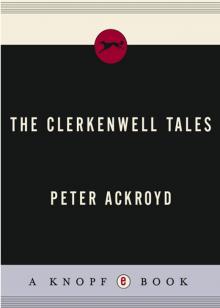 The Clerkenwell Tales
The Clerkenwell Tales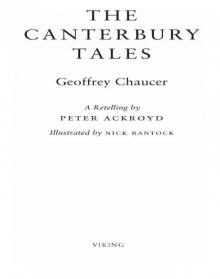 The Canterbury Tales
The Canterbury Tales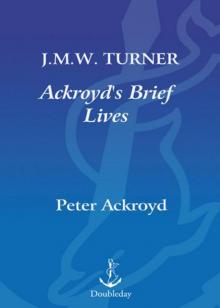 J. M. W. Turner
J. M. W. Turner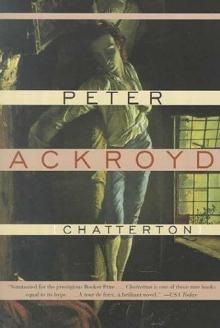 Chatterton
Chatterton The Canterbury Tales – A Retelling
The Canterbury Tales – A Retelling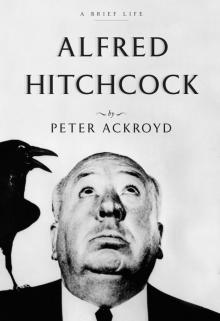 Alfred Hitchcock
Alfred Hitchcock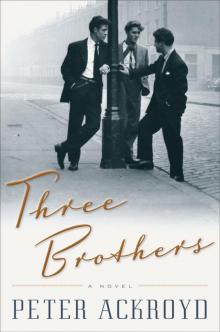 Three Brothers
Three Brothers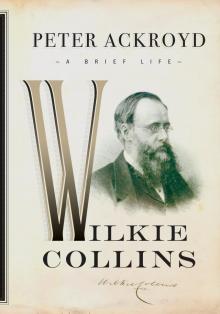 Wilkie Collins
Wilkie Collins Venice
Venice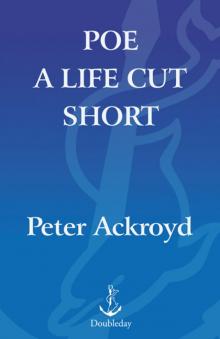 Poe
Poe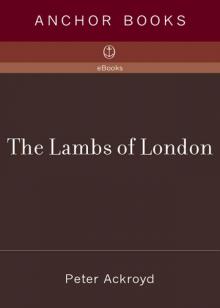 The Lambs of London
The Lambs of London London
London Queer City
Queer City Revolution, a History of England, Volume 4
Revolution, a History of England, Volume 4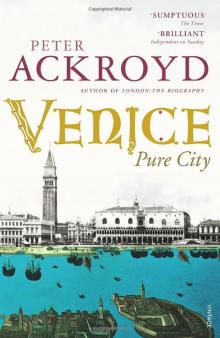 Venice: Pure City
Venice: Pure City Foundation
Foundation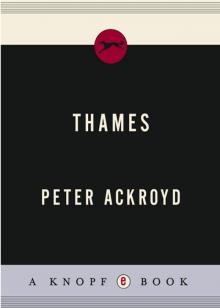 Thames
Thames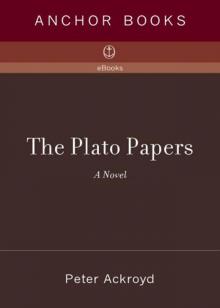 The Plato Papers
The Plato Papers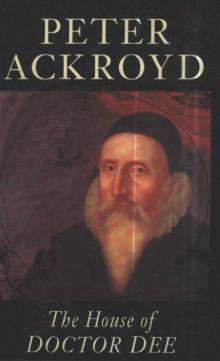 The house of Doctor Dee
The house of Doctor Dee Rebellion: The History of England from James I to the Glorious Revolution
Rebellion: The History of England from James I to the Glorious Revolution Albion: The Origins of the English Imagination
Albion: The Origins of the English Imagination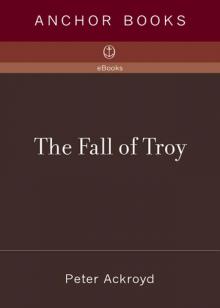 The Fall of Troy
The Fall of Troy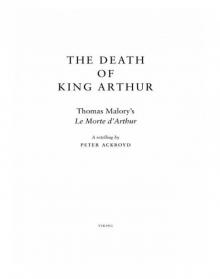 The Death of King Arthur
The Death of King Arthur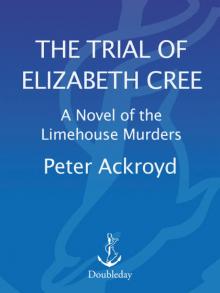 The Trial of Elizabeth Cree
The Trial of Elizabeth Cree London: The Biography
London: The Biography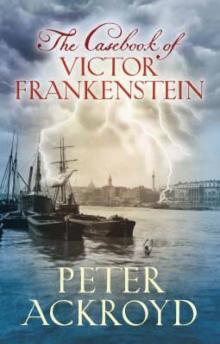 The Casebook of Victor Frankenstein
The Casebook of Victor Frankenstein Hawksmoor
Hawksmoor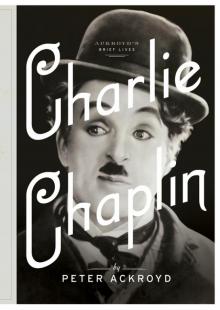 Charlie Chaplin
Charlie Chaplin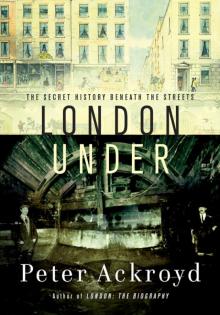 London Under
London Under